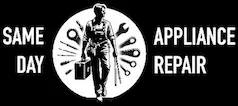Air Conditioner Repair Cost
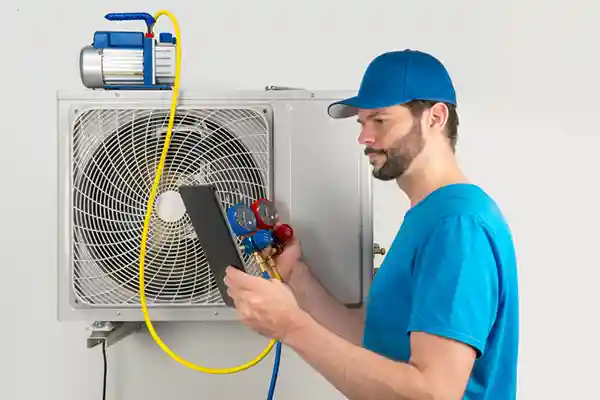
At Same Day Appliance Repair, we are a family-owned business committed to enhancing your customer experience. We understand the frustration of appliance repairs, and we pride ourselves on our transparency and reliability. This page is created to give you a thorough understanding of our pricing policies, the costs associated with an air conditioner repair, and our unique approach to service designed to relieve you of the stress of appliance breakdowns.
We understand the importance of keeping your air conditioner units running efficiently without breaking the bank. We offer competitive pricing tailored to your specific repair needs and guarantee transparent cost estimates with no hidden fees, ensuring you feel comfortable about the affordability of our services.
Have Questions? We're Here to Help!
Feel free to call us if you have any questions. Our team is dedicated to helping you and making sure you're happy.
How Much Does It Cost To Repair an Air Conditioner?
The typical cost to repair an air conditioner varies from $100 to $1200, including parts and labor. The price can vary based on the issue type and your appliance's brand and model. Our technician will first need to diagnose the problem to provide you with the most accurate estimate. Following the diagnosis, you'll receive a detailed price breakdown.
Our Pricing Policy For Air Conditioner Repair And How We Work
There are four costs to consider when making your air conditioner work optimally.
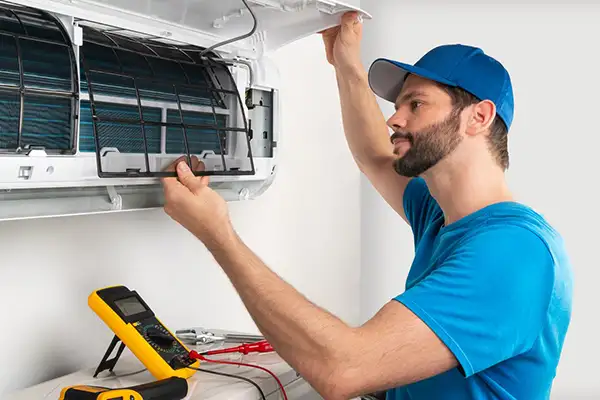
Maintenance Cost
Regular maintenance is essential for your air conditioner's longevity and optimal performance. We recommend annual maintenance, which includes replacing air filters, checking the thermostat, cleaning coils, inspecting and cleaning the drain line, checking system controls, inspecting electrical connections, lubricating moving parts, inspecting and testing capacitors, checking refrigerant levels, inspecting fan motor and blades, checking ductwork for leaks, inspecting for safety issues, and performing an overall system performance check to ensure efficient operation and prevent potential issues. Our fee for this comprehensive service varies from $200 to $450, depending on the unit type.
This preventive approach not only saves you money by reducing the need for repairs but also enhances the efficiency and lifespan of your appliance. Schedule your maintenance appointment with us today and ensure your air conditioner runs smoothly.
Service fees
If your air conditioner requires repair, we charge a service fee of $120, which includes a detailed price breakdown. This fee is waived if you choose to proceed with the repair. Unlike some companies, we guarantee you will not pay this fee if we cannot diagnose properly. Our technicians are highly trained and equipped with specialized tools to accurately diagnose and resolve issues, ensuring transparency and fairness in our charges.
Labor cost
See prices below. The cost of labor depends on the complexity of the air conditioner repair and the estimated time required. We ensure transparency by providing a detailed quote before you commit to the service. Should the repair take longer than expected, you won't be charged extra; we waive the diagnostic fee upon proceeding with the repair, and you will pay the cost of the repair and parts if needed.
Replacement Parts
See prices below. While not every repair needs new parts, certain situations require replacement parts to restore your air conditioner to peak performance. Our technicians carry various parts in their vehicles, which usually enables same-day repairs. If a part must be ordered, the cost will vary depending on the repair, brand, and model of your air conditioner.
*We always do our best to find parts at a lower price for our customers. We do not make extra money on the parts; our priority is to make it as easy as possible for the customer.
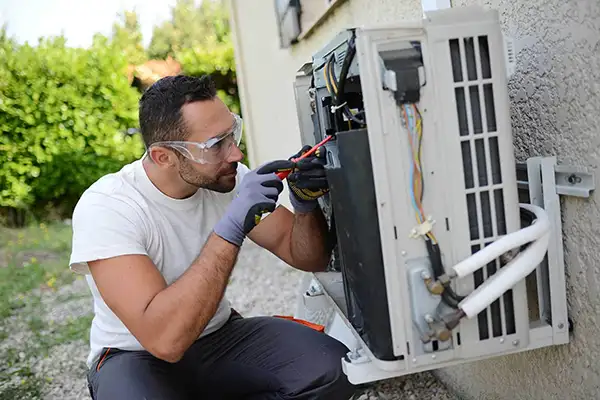
Air Conditioner Repair Cost - Labor Only Excluding Parts
Here are some common problems and price ranges
$50 - $150
Hissing sounds, ice on the compressor, inadequate cooling.
Refrigerant Leak
$100 - $350
Increased energy bills, reduced cooling efficiency, and overheating of the unit.
Dirty Condenser Coils
$75 - $200
Water leakage around the AC unit, humidity issues inside.
Clogged Drain Line
$75 - $150
$100 - $250
AC unit overheats, poor air circulation, unit shuts off randomly.
Malfunctioning Fan
$100 - $200
$100 - $150
AC struggles to start, frequent electrical issues.
Worn Contactor
$90 - $170
This list provides a basic guideline on potential labor costs for common AC issues, helping homeowners budget for repairs. Always consult with a professional technician for accurate estimates based on your specific situation.
Air Conditioner Replacement Parts Cost
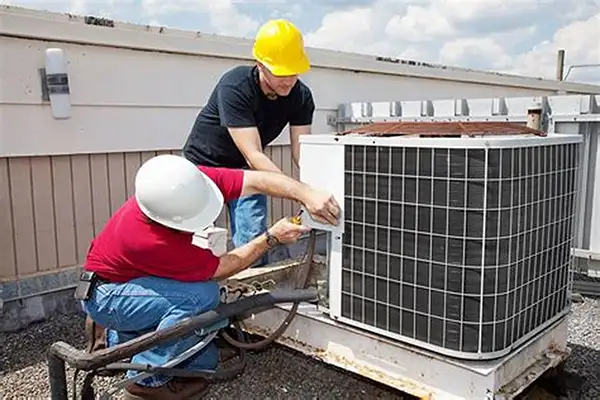
$30 - $250
The fluid essential for cooling; the cost can vary depending on the type of refrigerant and the amount needed.
Refrigerant - price per pound
$100 - $350
Located in the outdoor unit, the coil dissipates heat from the air by expelling it outside the building.
Condenser Coil
$400 - $1200
$50 - $150
$600 - $1200
$100 - $300
$10 - $100
$15 - $50
Located inside the air handler, it absorbs heat from air in your home, thus cooling it.
Evaporator Coil
$250 - $1000
This list offers a broad range of parts that might need replacement over the life of an air conditioner, helping you understand potential costs and functions.
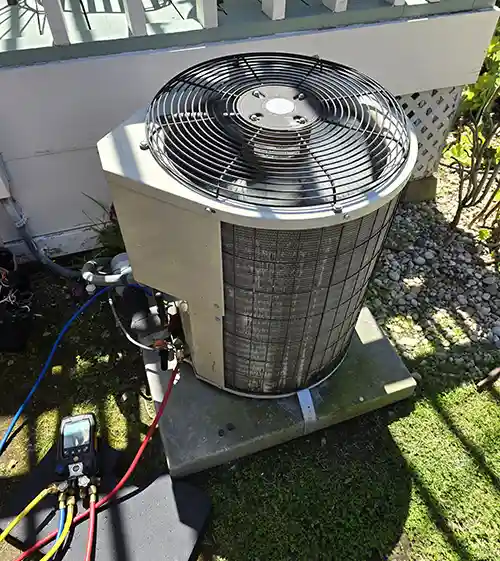
What is Included in the Annual/Semi-annual Air Conditioner Maintenance
Regular maintenance of an air conditioning system is crucial for ensuring efficiency, prolonging its life, and reducing energy costs. Whether conducted annually or semi-annually, air conditioner maintenance typically involves a variety of checks and tasks that keep the system running smoothly. Here are some of the key components typically included in routine AC maintenance:
- Replacing Air Filters: Checking and replacing air filters regularly helps ensure efficient airflow and improve indoor air quality. Clogged or dirty filters can strain the system and reduce its efficiency.
- Checking the Thermostat: Ensuring the thermostat operates properly and is calibrated correctly helps in accurately measuring and controlling the temperature according to your settings.
- Cleaning Coils: Removing dirt from both the evaporator and condenser coils is crucial as accumulation can reduce the system's ability to absorb and dispel heat.
- Inspecting and Cleaning the Drain Line: Clearing the condensate drain of algae and debris prevents water damage and maintains proper humidity levels.
- Checking System Controls: Making sure that the system starts, operates, and shuts off properly is another critical aspect of maintenance.
- Inspecting Electrical Connections: Checking connections to ensure they are tight and not showing signs of wear, and measuring voltage and current on motors, are essential for safety and function.
- Lubricating Moving Parts: Reducing friction in motors and bearings through lubrication helps decrease electricity usage and prevent potential failures.
- Inspecting and Testing Capacitors: Ensuring capacitors help start and keep the motors running can prevent breakdowns during operation.
- Checking Refrigerant Levels: Monitoring refrigerant levels is important as incorrect amounts can reduce efficiency and indicate potential leaks.
- Inspecting Fan Motor and Blades: Checking for wear and damage, and ensuring they operate smoothly without excessive noise, are important for maintaining airflow efficiency.
- Checking Ductwork for Leaks: Identifying and sealing leaks in ductwork can significantly enhance efficiency and ensure even cooling or heating.
- Inspecting for Safety Issues: This includes checking for any gas leaks in systems that use gas.
- Performing an Overall System Performance Check: Assessing the system's overall performance to ensure smooth and efficient operation, including a temperature differential check across the evaporator coil to assess cooling performance.
These maintenance tasks help keep your air conditioning unit functioning optimally and identify potential issues before they become serious problems, thus saving on future repair costs. Different providers might offer varying levels of detail in their maintenance routines, so it's good to verify exactly what is included when you book a service. Regular maintenance also aligns with manufacturer's warranties, which often require documented maintenance to remain valid.
FAQs
Which brands of air conditioners do you service?
We work with all major brands of air conditioners such as:
- Carrier
- Lennox
- Trane
- American Standard
- York
- Rheem
- Goodman
- Daikin
- Amana
- LG
If you don't see your AC brand on the list, don't hesitate to contact, because are technicians are highly skilled to repair and service almost any kind of air conditionerds.
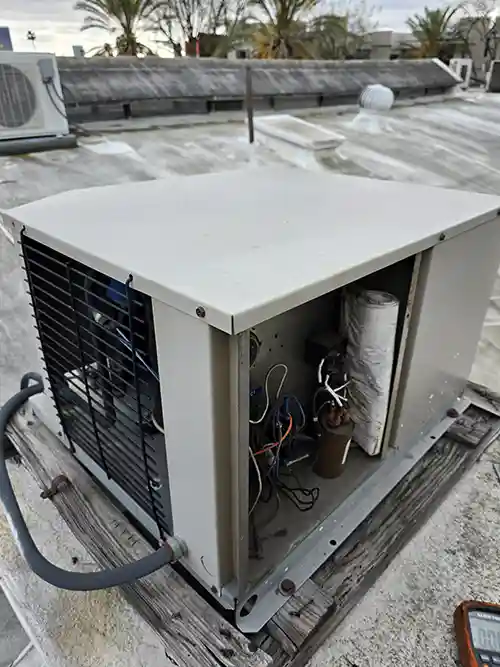
How To Save on Air Conditioner Repair Costs?
To save money on air conditioner repair costs, regularly maintaining your HVAC system can prevent complex repairs and reduce the frequency of service call fees. Schedule inspections with a licensed HVAC technician to catch issues like refrigerant leaks early, ensuring your AC system continues to produce cool air efficiently. Opt for minor repairs promptly to avoid more significant issues like a failing compressor, which typically costs more in ac repair costs. Additionally, ensure your air conditioning unit is covered under the manufacturer's warranty to potentially lower repair expenses, and consider working with a reputable local HVAC company known for fair pricing on HVAC repairs. Using these strategies can help manage and reduce overall ac repair costs while maintaining the effective operation of your HVAC unit.
Which Factors Impact AC Repair Cost Estimates?
Several factors impact AC repair cost estimates, including the complexity of the issue, the type of AC system involved—whether it's a central air system, ductless mini split, or a heat pump—and the specific components affected, such as the AC compressor or evaporator coils. HVAC technician service call fees, the cost of professional installation, and whether the repair is an emergency or scheduled influence the overall AC repair cost. Additionally, a refrigerant leak, compressor replacement, or complete replacement of an old unit can significantly increase the cost to repair. The design of the system, such as ductless mini splits versus traditional central AC units, also affects the price. Installation costs, material costs during hot weather when demand is high, and whether the unit is covered by a home warranty can further modify the expected expenses. Lastly, the rates charged by different HVAC companies and the geographic location can lead to variations in what homeowners should expect to pay for residential air conditioner repairs.
What are the most common parts that need replacement in an air conditioner?
Common replacement parts include the AC condenser fan motor, AC blower motor, AC evaporator coil, and AC compressor.
How much does it typically cost to replace a Freon in an AC unit?
The cost varies based on AC unit size and type but expect a range depending on local service rates and the amount of refrigerant needed.
What are the signs that an AC needs repairing?
Signs include unusual noises, insufficient cooling, frequent cycles, higher than usual energy bills, and visible leaks.
Is it more cost-effective to repair or replace a central air conditioner?
This depends on the age of the unit, the extent of the damage, and the cost of the repairs compared to the price of a new unit.
Why is AC repair often considered expensive?
Costs can be high due to the complexity of the systems, the need for specialized tools and skills, and the price of replacement parts.
How often should you replace an air conditioner?
Typically, air conditioners last about 10 to 15 years. Replacement might be more cost-effective if your unit is old and frequently needs repairs.
How do I hire a professional HVAC technician?
Look for licensed, insured professionals with good reviews and reasonable quotes. Ask about their experience, especially with your type of AC unit.
What factors affect the cost of fixing an AC unit?
Factors include the type of repair, cost of replacement parts, labor costs, the urgency of the service, and whether it's a DIY or professional repair.
How long does it typically take to repair an AC?
The time can vary from a few hours to a full day, depending on the complexity of the repair and availability of parts.
Who fixes air conditioners, and what should I ask AC repair services?
Certified HVAC technicians fix air conditioners. Ask about their certifications, experience, warranty on parts and labor, and detailed repair estimates.
Are AC repairs worth the cost?
Generally, yes, if they extend the life of your unit significantly. However, if repairs are frequent and costly, replacement might be a better option.
What is the cost of a home AC flush to unclog the drain line?
This is usually one of the less expensive repairs, but costs can vary based on accessibility and the severity of the clog.
What are the common components of residential air conditioning systems?
Residential air conditioning systems typically include several key components: the AC compressor, central air handling units (central AC), and often a heat pump. These components are integral parts of HVAC systems designed to control the flow and temperature of air within residential spaces efficiently.
What initial costs are involved when an air conditioning system malfunctions?
When an air conditioning system malfunctions, homeowners can expect to pay a service call fee as the initial cost. This fee covers the technician's visit to diagnose issues within the system, such as compressor malfunction or problems with the heat pump.
What are some typical problems that might occur with air conditioning systems?
Typical problems in air conditioning systems include compressor malfunction, thermostat replacement needs, and issues with the heat pump's functionality. These problems can affect the overall efficiency of AC units, leading to increased AC usage and higher energy bills.
How do emergency repairs affect the cost of maintaining an air conditioning system?
Emergency repairs often involve a higher cost due to the urgency and the need for immediate resolution, which can sometimes lead to a repair cost multiplied, especially outside of regular business hours. Homeowners should be prepared for these potential expenses in maintaining their HVAC systems.
When should a homeowner consider replacing their air conditioner?
Homeowners should consider replacing their air conditioner when repairs become too frequent or costly, particularly if the repair costs multiply over time. Investing in a new air conditioner might be more cost-effective in the long run, especially if the existing unit is old and less efficient.
What are the benefits of using heat pumps in residential HVAC systems?
Using heat pumps in residential HVAC systems is beneficial for efficiently managing how warm air and cool air are circulated within a home. Heat pumps can significantly reduce energy consumption by transferring heat instead of generating it, which can lead to lower utility bills.
What should homeowners expect to pay when installing a new HVAC system?
When installing a new HVAC system, homeowners should expect to pay various costs, including the price of the new air conditioner, labor for HVAC installation, and potentially a smart thermostat to enhance the system's efficiency. The total cost can vary greatly depending on the system's complexity and the home's specific needs.
What is the typical cost for residential air conditioner repair, particularly the heat exchanger, and how can homeowners minimize these repair expenses?
The cost for residential air conditioner repair, especially when dealing with the heat exchanger, can range from $100 to $1,200, with an average expense around $500. These costs can vary significantly based on the damage's severity and the air conditioner's model. To minimize these repair expenses, homeowners can adopt several strategies:
- Regular Maintenance: Routine maintenance is essential for elongating the lifespan of any residential air conditioning unit and preventing costly repairs. This includes tasks like cleaning or replacing filters, checking refrigerant levels, and ensuring the system operates efficiently. Regular check-ups can help identify issues early, potentially saving significantly on air conditioner repair cost down the line.
- Check Warranty Coverage: Before proceeding with repairs, it's crucial to verify whether your air conditioner is still under warranty. Some warranties may cover critical components like the heat exchanger, which can considerably reduce the repair costs.
- Obtain Multiple Estimates: When a repair is necessary, getting several estimates from different HVAC professionals is advisable. This approach allows homeowners to compare costs and services, ensuring they receive the best value for their money.
- DIY Fixes for Minor Issues: For less severe issues, homeowners with some DIY skills might consider handling the repairs themselves. Numerous online resources offer step-by-step guides and tutorials for basic air conditioner maintenance and repairs, which can help save on professional service fees.
Implementing these tips can help homeowners effectively manage and reduce the costs associated with residential air conditioner repairs, particularly for critical components like the heat exchanger.
